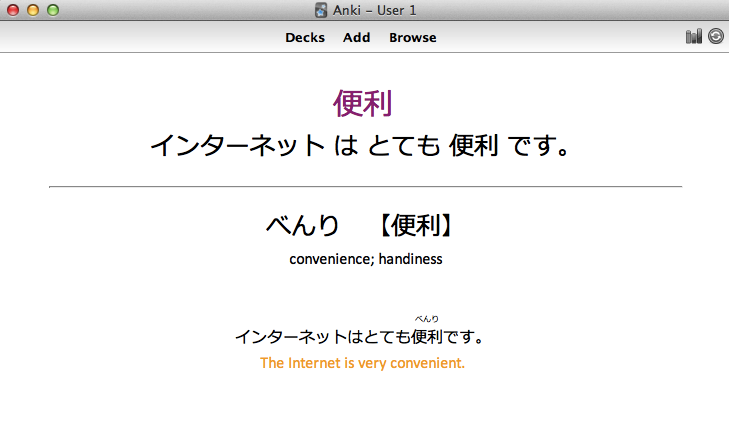First of all, you'll need to download Anki, a spaced repetition flashcard program that really does work wonders for your brain. If you don't know how it works, the first time you see a new flashcard, you'll see it 10 minutes later, then the next day if you get it right, then 3-4 days from then, and then 6-7 days later, etc. It tries to move the information from your short-term memory to your long-term memory over time, and I vouch for this program completely.
 Now then... I'm using three decks inside of Anki. The first deck series is the Jalup Beginner 1,000 sentence deck. It costs $24.99 for each stage of 250 sentences, but the information in the sentences is invaluable and definitely worth it.
Now then... I'm using three decks inside of Anki. The first deck series is the Jalup Beginner 1,000 sentence deck. It costs $24.99 for each stage of 250 sentences, but the information in the sentences is invaluable and definitely worth it. The second deck is Japanese Level Up's RTK mod. Basically, James Heisig's "Remembering the Kanji" series teaches over 3,000 kanji characters, but not all of them are necessary to learn. The RTK mod eliminates the unnecessary kanji and leaves you with 1,901 characters to master. Since I learned the 2,200 characters in the first book back in 2012, I'm breezing through this stage of Japanese studying.
The second deck is Japanese Level Up's RTK mod. Basically, James Heisig's "Remembering the Kanji" series teaches over 3,000 kanji characters, but not all of them are necessary to learn. The RTK mod eliminates the unnecessary kanji and leaves you with 1,901 characters to master. Since I learned the 2,200 characters in the first book back in 2012, I'm breezing through this stage of Japanese studying. And the last deck that I'm using isn't actually used in the Japanese Level Up program, but I find it incredibly useful. A while ago, I subscribed to iKnow's Core series that taught the 6,000 most used Japanese words. The Anki deck called "Core10Kv4" teaches the 6,000 words in the Core 6,000 series plus roughly 4,000 additional words. Example sentences and audio from native speakers is included with every word, so expect this deck to take a while to download. I should also mention that the Jalup decks also have native audio for every sentence.
And the last deck that I'm using isn't actually used in the Japanese Level Up program, but I find it incredibly useful. A while ago, I subscribed to iKnow's Core series that taught the 6,000 most used Japanese words. The Anki deck called "Core10Kv4" teaches the 6,000 words in the Core 6,000 series plus roughly 4,000 additional words. Example sentences and audio from native speakers is included with every word, so expect this deck to take a while to download. I should also mention that the Jalup decks also have native audio for every sentence.
So in the past 13 days, I have brushed up on roughly 375 kanji, 375 sentences, and 375 vocabulary words. Breaking up my daily studying into three different categories (kanji, sentences, and vocab) makes it easier to learn or relearn about 25-50 flashcards from each category every day. And then if I want to study more on any given day, I'll just research Japanese culture and history or take a look at the Dictionary of Basic Japanese Grammar for a few extra pointers.
What do you think of this Japanese studying routine? What do you do when you study Japanese or any subject for that matter? Don't hesitate to leave a comment below.
Later,
Adam
アダム





No comments:
Post a Comment